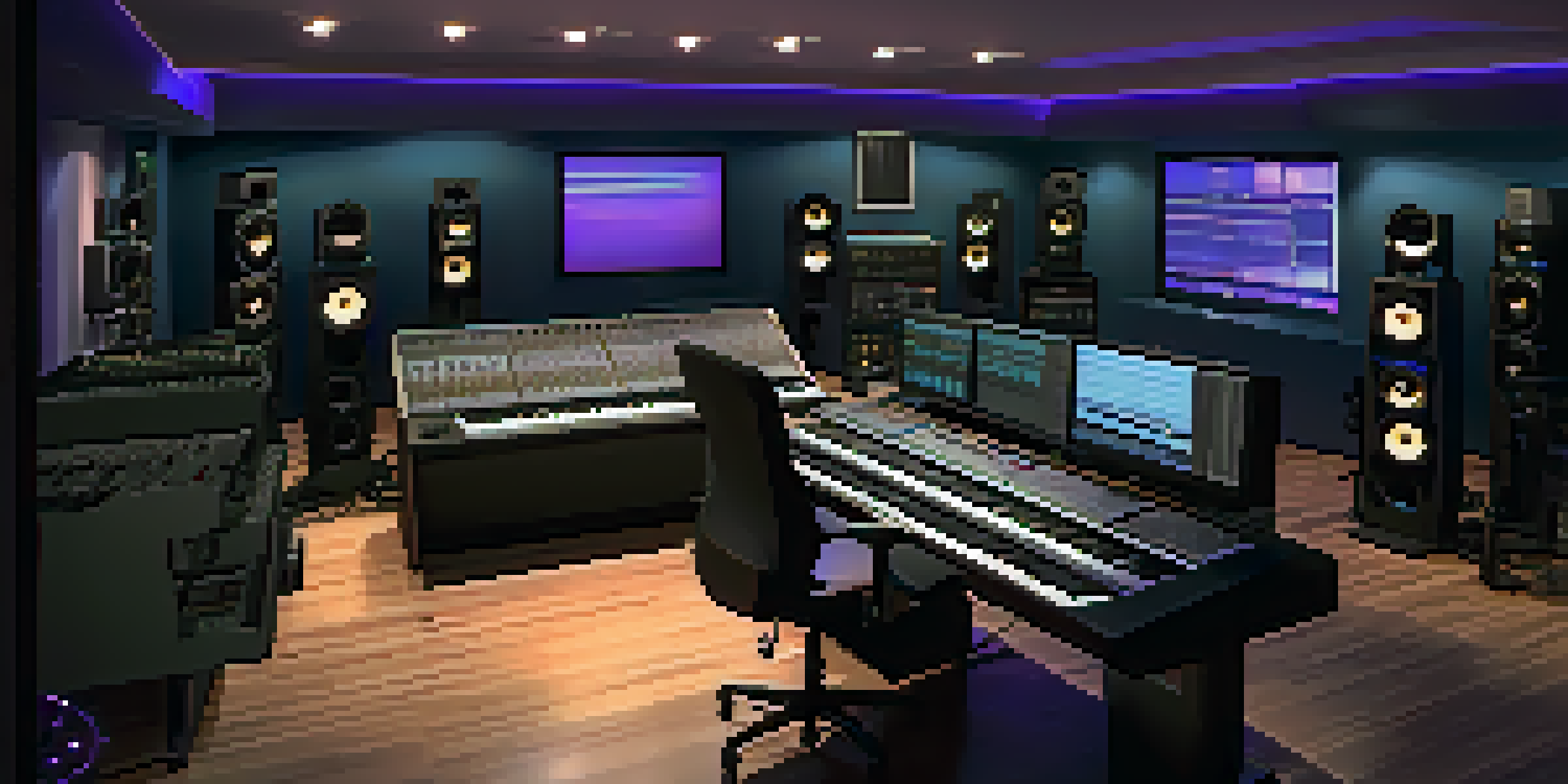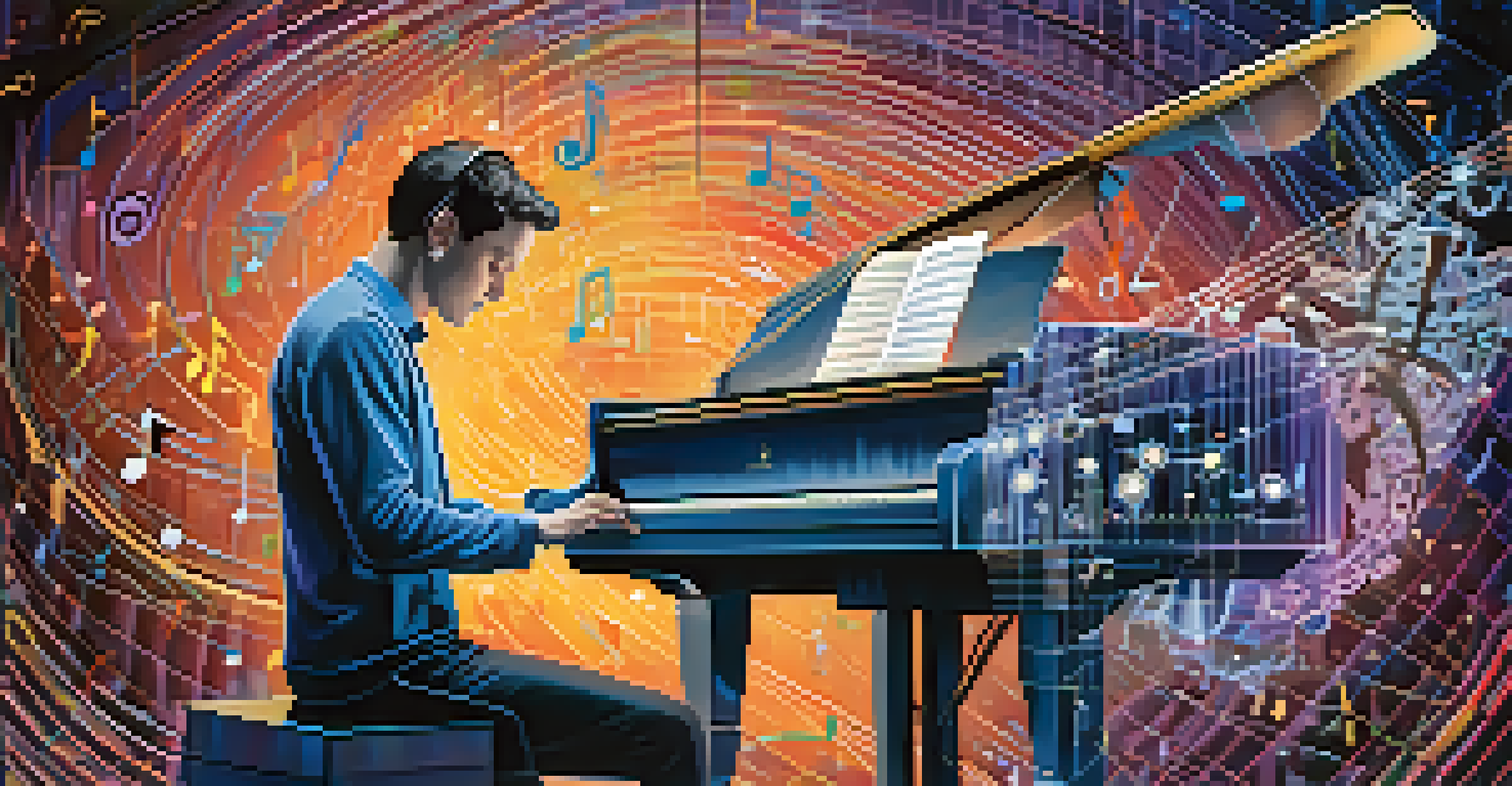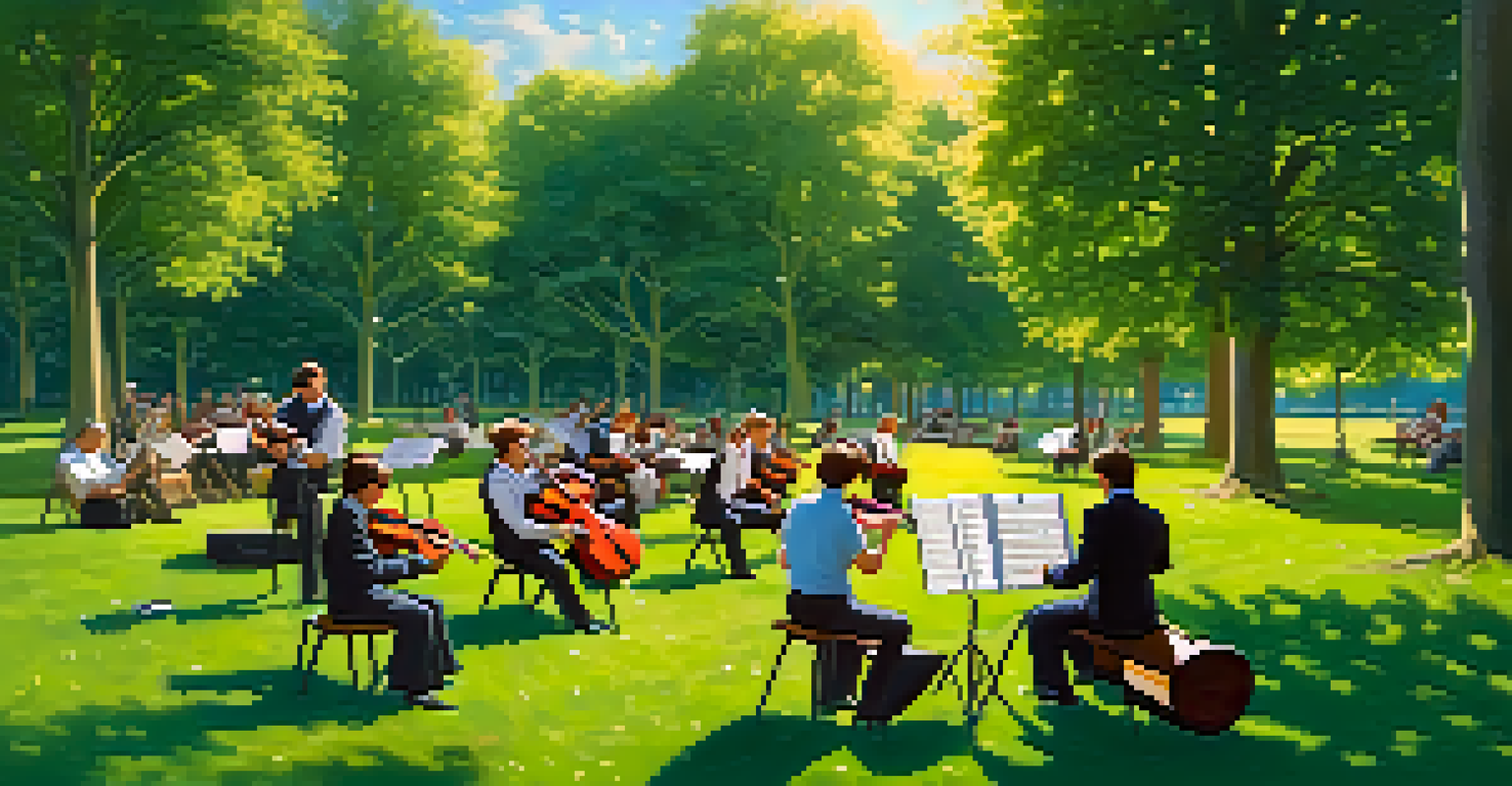How Technology is Revolutionizing Film Score Composition

The Evolution of Film Scoring: A Technological Perspective
Film scoring has come a long way since the days of live orchestras accompanying silent films. Initially, composers relied heavily on acoustic instruments and traditional notation to create their soundtracks, but advancements in technology have opened up a whole new world of possibilities. Today, digital audio workstations (DAWs) and software instruments allow composers to craft intricate scores without needing a full orchestra in the room.
Music is the shorthand of emotion.
This shift has not only made scoring more accessible for independent filmmakers but has also allowed for greater experimentation with sound. Composers can manipulate audio samples, layer sounds, and even incorporate artificial intelligence to generate new musical ideas. This technological evolution has fundamentally changed the way composers think about and approach their craft.
Ultimately, the integration of technology into film scoring is not just about convenience; it's about pushing creative boundaries and exploring new artistic avenues. As we delve deeper into this topic, we’ll uncover how these tools are shaping the future of film music.
Digital Audio Workstations: The Composer’s New Best Friend
Digital Audio Workstations, or DAWs, have become essential tools for modern composers. Programs like Logic Pro, Ableton Live, and Pro Tools allow composers to compose, record, edit, and mix their scores all in one place. This means that film composers can work more efficiently and collaboratively, even if they’re miles apart.

With the ability to use virtual instruments and synthesizers, composers can create rich soundscapes that would have been impossible to achieve with traditional methods. You can think of a DAW as a digital canvas where composers can paint their musical ideas without the constraints of physical instruments. This flexibility encourages creativity and experimentation, leading to unique and innovative scores.
Tech Revolutionizes Film Scoring
Advancements in technology, including DAWs and AI, have transformed film scoring, making it more accessible and innovative for composers.
Moreover, DAWs often come with built-in resources, such as sound libraries and sample packs, which can help composers quickly find the right sounds for their projects. This ease of use is especially beneficial for filmmakers on a tight schedule, allowing for a more streamlined production process.
The Role of Artificial Intelligence in Composition
Artificial intelligence (AI) is making waves in many industries, and film scoring is no exception. AI tools can analyze existing musical scores and generate new compositions based on learned patterns, which can be a game-changer for composers looking for inspiration. Imagine having a virtual collaborator that helps you brainstorm ideas or suggests variations on a theme.
The music can speak to everyone, it can unite people, and it can create emotions that are universal.
While some may fear that AI could replace human composers, the reality is that it serves as a tool to enhance creativity rather than replace it. Composers can use AI-generated ideas as a springboard, refining and personalizing them to fit their vision. This collaboration between human intuition and machine learning opens up exciting new possibilities in film music.
The emergence of AI in film scoring not only streamlines the creative process but also offers fresh perspectives on how music can interact with visual storytelling. As technology continues to evolve, so too will the ways in which composers utilize AI in their work.
Virtual Instruments: The New Sound Palette for Composers
Virtual instruments have revolutionized the way composers approach their craft. These software-based instruments replicate the sound of traditional instruments and often come with an array of customizable features. For example, a virtual string ensemble can be adjusted to simulate various playing techniques, giving composers the ability to create nuanced performances without needing to hire musicians.
This flexibility allows for a broader exploration of sound, empowering composers to experiment with different styles and genres. Whether you're looking to create an epic orchestral score or a minimalist electronic piece, virtual instruments provide the versatility to achieve your desired sound. It’s like having an entire orchestra at your fingertips!
AI Enhances Creative Collaboration
Artificial intelligence serves as a valuable tool for composers, providing inspiration and new ideas while enhancing the creative process.
Furthermore, advancements in technology have led to higher-quality samples and more realistic playback, making it easier for composers to convey their ideas to directors and producers. As a result, the gap between a composer’s vision and the final product has narrowed, leading to more cohesive and impactful film scores.
Collaboration Tools: Connecting Composers and Filmmakers
In the past, communication between composers and filmmakers often took place in person, which could lead to delays and misunderstandings. However, technology has changed the game with collaboration tools that facilitate real-time communication and feedback. Platforms like Slack, Zoom, and specialized software for sharing music tracks allow composers and filmmakers to work together seamlessly, regardless of geographical distance.
This newfound connectivity fosters a more dynamic collaboration, as filmmakers can provide immediate input on scores, and composers can make adjustments on the fly. This instant feedback loop not only enhances the creative process but also strengthens the relationship between the composer and the filmmaker, resulting in a more cohesive final product.
Moreover, cloud storage solutions allow for easy sharing of files and drafts, ensuring that everyone involved in the project has access to the most up-to-date materials. This level of collaboration is essential in today’s fast-paced film industry, where timely communication can make or break a project.
The Impact of Streaming and Digital Distribution on Film Scores
With the rise of streaming services, the way film scores are consumed has transformed dramatically. Audiences no longer just listen to scores in the context of a film; they actively seek out these soundtracks on platforms like Spotify, Apple Music, and YouTube. This shift has created new opportunities for composers to reach broader audiences and showcase their work beyond the silver screen.
As a result, composers are now more inclined to think about how their music can stand on its own, creating memorable melodies and themes that resonate with listeners outside of the film context. This trend encourages composers to craft more dynamic scores that can engage audiences even when they aren’t watching the film, blurring the lines between film music and standalone compositions.
Streaming Changes Audience Engagement
The rise of streaming services has shifted how film scores are consumed, encouraging composers to create memorable music that resonates beyond the film.
Additionally, the accessibility of digital platforms allows independent composers to share their work without the need for a traditional record label, democratizing the industry. This means that unique voices and diverse styles can find their way into the spotlight, enriching the film scoring landscape.
The Future of Film Scoring: A Technological Frontier
As technology continues to advance, the possibilities for film scoring are virtually limitless. We can expect to see more integration of immersive audio technologies, such as spatial audio and virtual reality (VR), which will allow composers to create soundscapes that envelop audiences in a truly unique experience. Imagine watching a film and feeling as though the music is surrounding you, enhancing the emotional impact of every scene.
Moreover, as composers become more adept at using these emerging technologies, we may see a rise in innovative storytelling techniques where music plays an even more integral role in narrative construction. This could lead to a future where film scores are not just accompaniment but a driving force in how stories are told.

Ultimately, the fusion of technology and artistry in film scoring promises to create a bold new era for composers and filmmakers alike. As we embrace these advancements, we can look forward to a richer cinematic experience that elevates the art of storytelling through music.